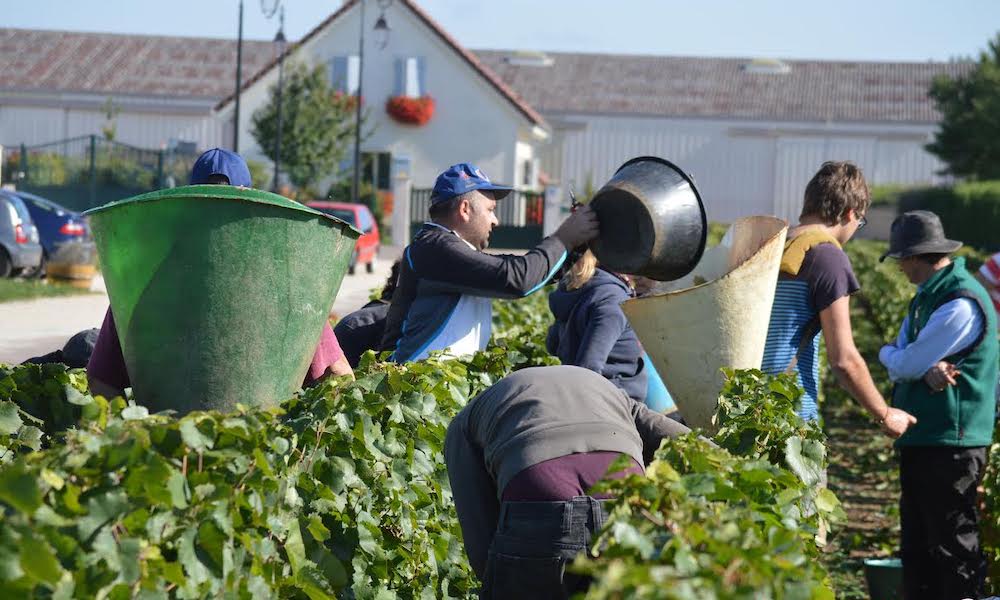Have you ever dreamed of hand-harvesting grapes for a few weeks as a summer job? For those who love wine, it’s the ultimate way to learn about France’s number one export. Although the pay is low, the rewards can be quite nice, especially if you like drinking top-quality hooch for free.

You might even get a few complimentary bottles to take home.
Yes, it’s true: wine makers have been known to give away some of their collection to valued workers. Even though summer hirelings typically earn SMIC (French minimum wage), many receive worthwhile perks like being housed on the compound, eating with the family and even laundry service.
One picker was gifted three 30-year-old bottles from the estate winery. It all depends on where you pick. But it’s not necessarily easy. Helpers toil for those bottles. Even so, there’s a certain je ne sais quoi about grape picking.
Harvest time is simply magical.
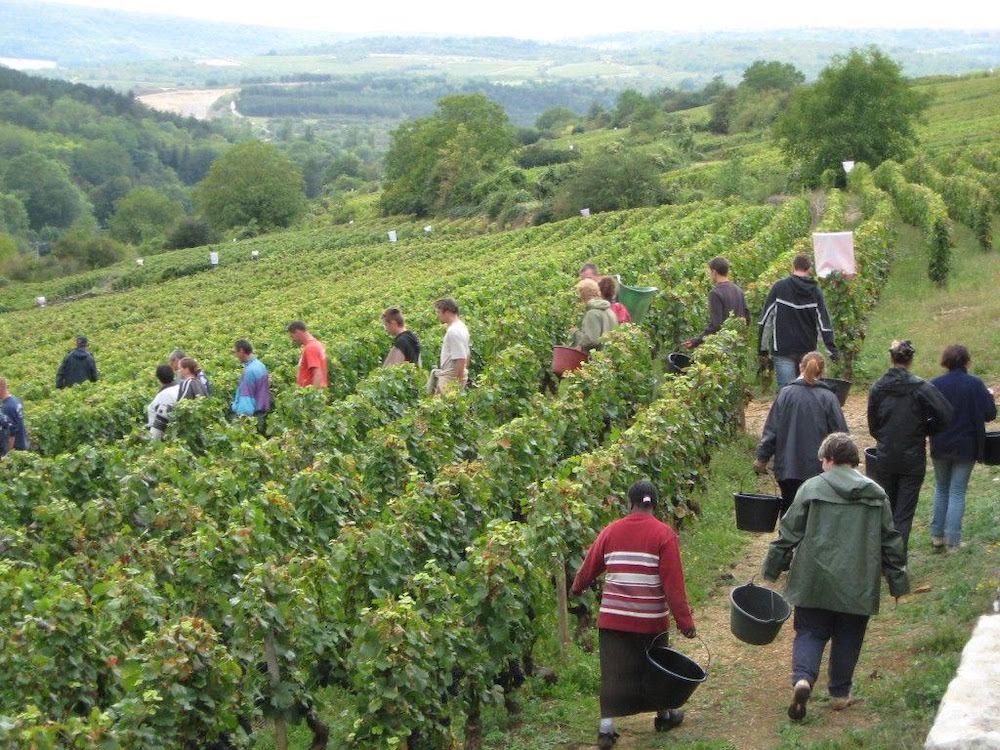
The who, where and why
If you want to join the ranks of 100,000 grape pickers who hit the French vineyards each year, it’s advised to start searching for a position between February and May to catch the August-October season.
The first consideration is to narrow down where to pick. The most well known locations for hand harvesting are Bordeaux, Burgundy and Champagne. Bordeaux is also touted as the wine capital of the world, Burgundy is one of the ultimate traditional old wine regions, and Champagne is known to use hand-picking exclusively. No matter which area you select, expect to labor alongside professional migrant workers, wine enthusiasts and students.
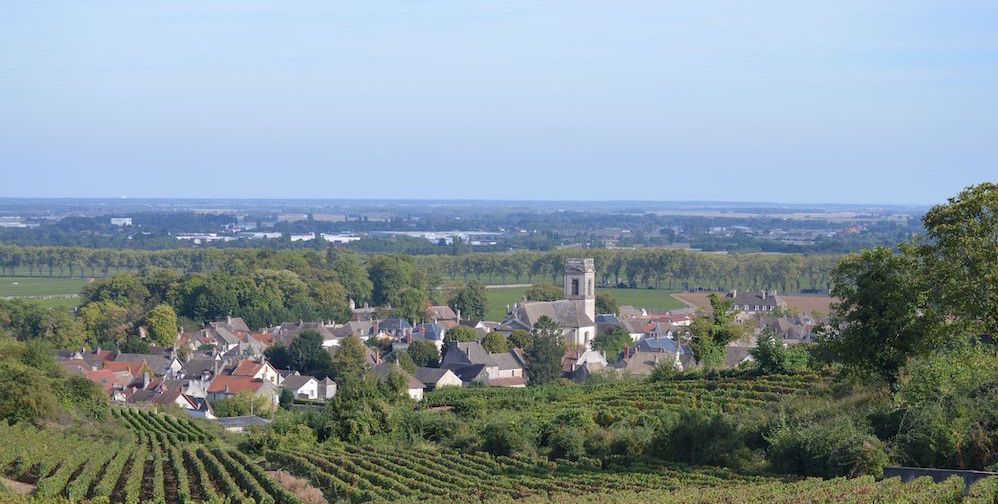
I picked at Domaine Virely-Rougeot in Pommard, Burgundy just down the street from Chateau Pommard. Our group included a French Tahitian, Eastern European Roma gypsies and a Buddhist monk (who didn’t drink a drop of wine). Even though it’s back-breaking, it’s still ranked the most popular summer job in France.
One worker reported having intermittent foot cramps for six months after the experience. So why try? If you think about it, manual harvesting is only done by top-quality wineries. Working for a vintner helps you go from merely drinking their wine to stepping behind the scenes and into their cherished domain.
Once you pick your region, you will want to select a producer. You could narrow your vineyard choices by grape variety.
It’s all about terroir
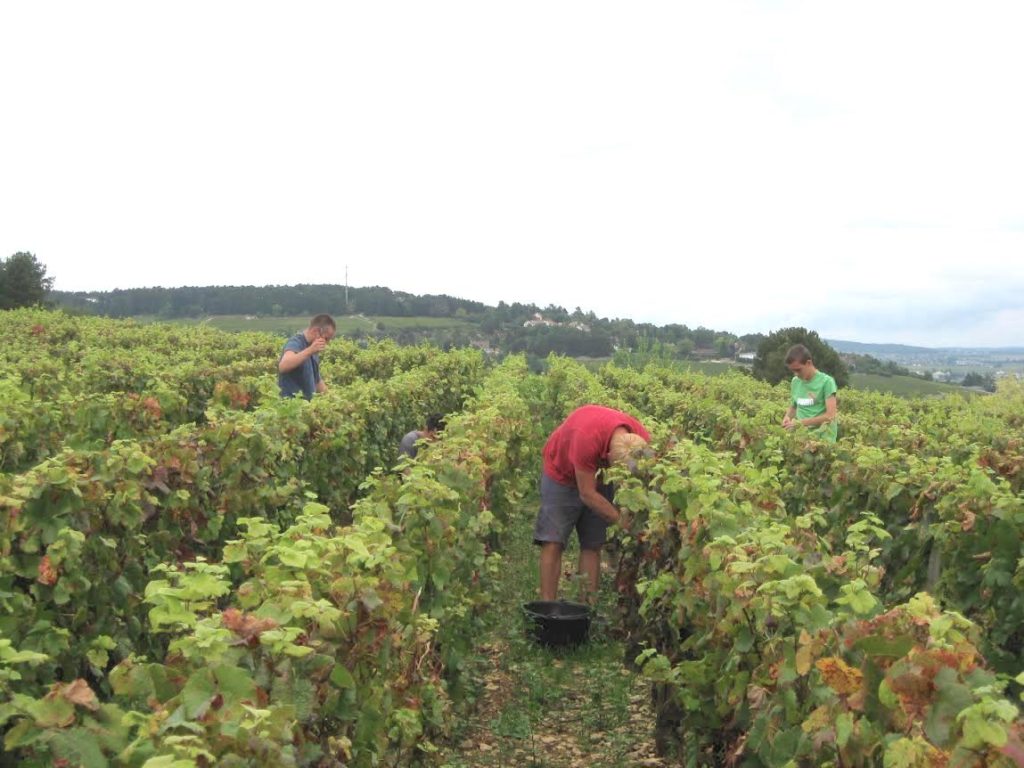
For example: One picker liked Pinot Noir, so he chose to go to Burgundy, which is the eminent region for producing that variety. The Pinot Noir fan managed to get hired at Virely-Rougeot, located in the village of Pommard where the vignerons are famous for their joie de vivre as well as being wonderful hosts during the vendanges. Not only was he offered wine and chocolate during breaks, but there was also singing around the table at mealtimes. And best of all, the owners treated him like a family member.
He gave precedence to this mom- and-pop winery over a chateau in order to work closely with the proprietors. His observation was that the owners of chateaux wineries are often corporations (big supermarket chains or Internet entrepreneurs). He just wanted to be part of a more personal operation.
Virely-Rougeot has vineyards in Pommard, Beaune and Meursault (read “some of the most coveted wine terrain in the world”). The worker who selected this winery gained a glimpse into not just the harvest but also the passion the family has for their vocation.
They retold stories of past generations who worked the land, discussed worries about the market and shared with surprising humor the weight of responsibility needed in order to carry on the tradition of their ancestors.
Learning the ropes

Here’s what to expect, which hasn’t changed much over the centuries:
• Expect to be up around 6 a.m. Once you are on site, the foreman passes out shears and bins and assigns each coupeur a row and a picking buddy. Your partner customarily faces you across the vine.
• Everyone is expected to keep up with the group through rain, mud-caked boots and slippery slopes. Be prepared to carry 10 kilos of grapes.
• Snipping bunches is easy enough but cut fingers happen, so consider leather gloves. Even so, harvesting grapes is easier than most fruit picking jobs. It’s not unusual to find vendangeurs as young as 16 and as old as 70.
Then there’s that moment as the sun rises. You take a deep breath and the earthy scent of limestone fills your lungs as you stretch your back. You can almost taste the minerals in the steam as the morning mist dissipates. The cloud of air that shrouds the valley stretches before you, as if it were painted on silk. The brume is pierced by a finely pointed spire that landmarks the village of Meursault.
The owner approaches. He hands you a grape. “Taste.” You comply, closing your eyes to focus as he says: “Some believe that each wine in our region has a style not unlike the village church.” The juice from the grape is remarkably similar to the final product. You look across the valley at the sophisticated steeple of Meursault, then the square church tower of Pommard: solid, well built.
He catches your eye, smiles and says, “THIS is TERROIR. Now, back to work.”
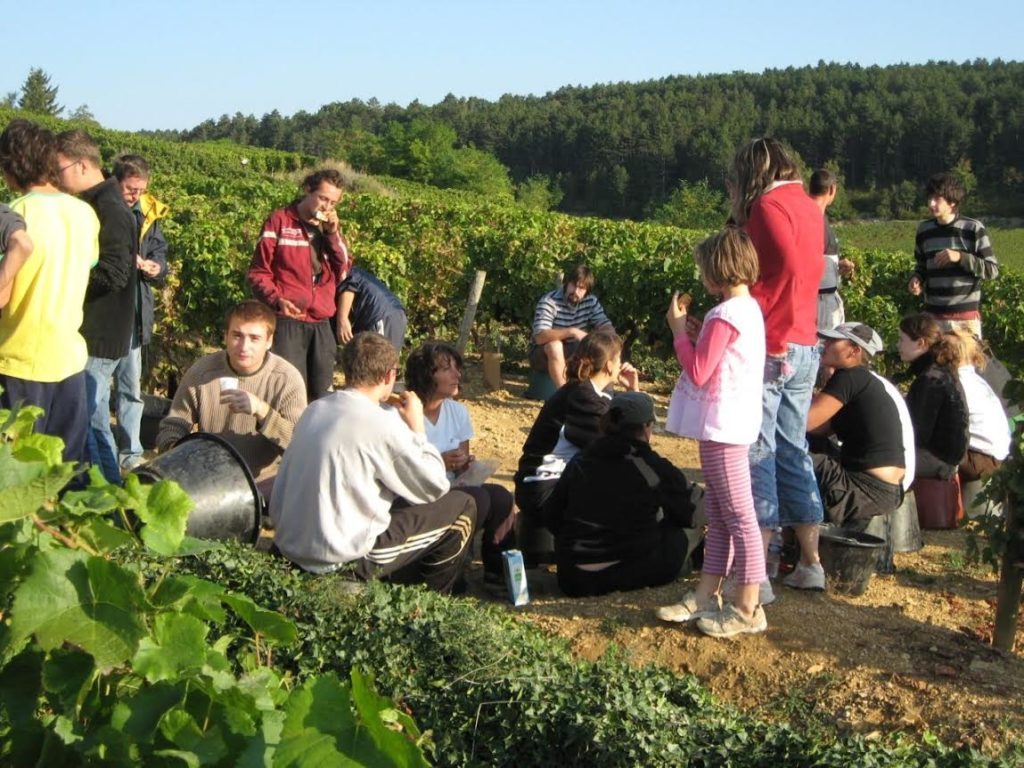
Anticipation for the mid-morning break of saucisson (dry-cured sausage), coffee, chocolate and the house Burgundy brings relief to the workers as they smoke, chit-chat. Maybe it’s the wine, but the convivial attitude of the group creates a communal resolve, reshaping the feeling of drudgery into a group effort. Pickers learn the ropes from veterans, and everyone bands together through humor, swearing and laughter.
“Porter! Porter!” Voices rise through the vineyard in chanting shouts.
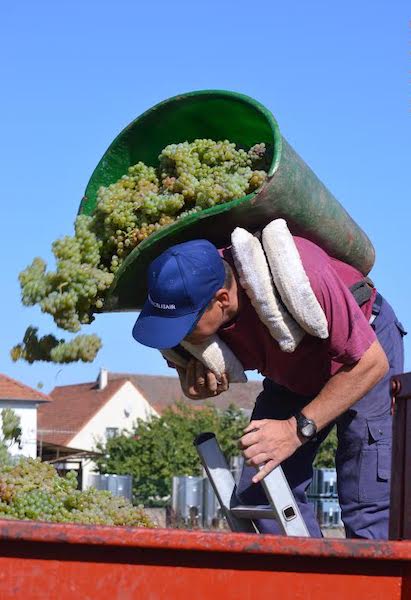
They are calling for the carrier of the hotte (the harvest basket) who collects everyone’s grapes to transport to the wagon. There is a mixed feeling of relief and sadness: pride of achievement and sorrow in having to take leave.
Everyone is in a chipper mood at the final dinner with participants sharing cadence songs, a hearty meal and arguably, the best wine, ever. The French consider grape picking to be a rite of passage and are quite nostalgic about it.
Even though many don’t ever want to repeat the experience, many insist that it’s the most meaningful summer job they ever worked. Others admit that once you work your way into this elite club, you will be tempted to sign up once again for the following season.
They just can’t get it out of their system.
Perhaps it is like the line from the Nora Jones song “I Don’t Know Why:” My heart is drenched in wine and you’ll be on my mind, forever.
If you’re interested in picking this year at Domaine Virely-Rougeot, contact them at: [email protected]
Or, contact them through their website here.
Here’s the link to Pt.2 of this series, with details, contacts and rules.

About the author:
Alice Verberne is a freelance artist and writer who purchased the École des Vatelottes in 1999. The historic building is located three hours southeast of Paris in the rural hilltop village of Bourmont, France. Her mission is to create an atelier as a meeting point to connect visitors to local artisans. She works as a consultant for GB Marketing Research Solutions writing feasibility studies for entrepreneurs.
See all of Alice’s posts here.
See more about France on Dispatches here.
Alice Verberne is a contributing writer for Dispatches Europe. She has worked in print journalism and magazine production in the United States and Europe throughout her career. She currently resides in France where she enjoys visiting former French speaking colonies and discussing history with the locals.


